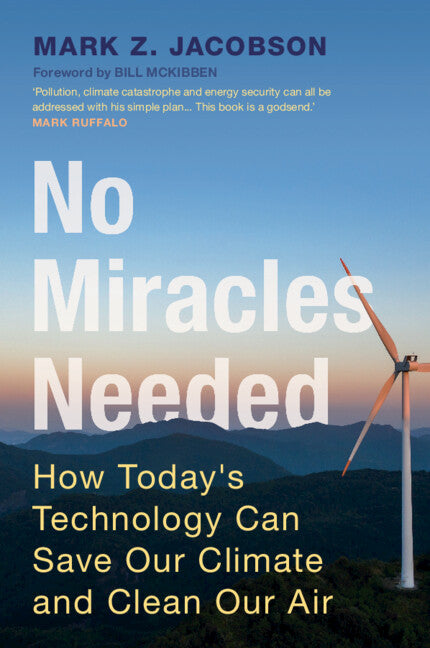Freshly Printed - allow 4 days lead
Couldn't load pickup availability
No Miracles Needed
How Today's Technology Can Save Our Climate and Clean Our Air
How you can solve the climate, energy and air pollution crises, without relying on 'miracle technologies'.
Mark Z. Jacobson (Author)
9781009249546, Cambridge University Press
Paperback / softback, published 2 February 2023
454 pages
22.8 x 15.2 x 2.5 cm, 0.74 kg
'Mark Jacobson's new book, greeted with hosannas by some leading environmentalists, is full of good ideas …' Bart Hawkins Kreps, Resilience.org
The world needs to turn away from fossil fuels and use clean, renewable sources of energy as soon as we can. Failure to do so will cause catastrophic climate damage sooner than you might think, leading to loss of biodiversity and economic and political instability. But all is not lost! We still have time to save the planet without resorting to 'miracle' technologies. We need to wave goodbye to outdated technologies, such as natural gas and carbon capture, and repurpose the technologies that we already have at our disposal. We can use existing technologies to harness, store, and transmit energy from wind, water, and solar sources to ensure reliable electricity, heat supplies, and energy security. Find out what you can do to improve the health, climate, and economic state of our planet. Together, we can solve the climate crisis, eliminate air pollution and safely secure energy supplies for everyone.
Foreword
Preface
1. What problems are we trying to solve?
2. WWS solutions for electricity generation
3. WWS solutions for electricity storage
4. WWS solutions for transportation
5. WWS solutions for buildings
6. WWS solutions for industry
7. Solutions for non-energy emissions
8. What doesn't work
9. Electricity grids
10. Photovoltaics and solar radiation
11. Onshore and offshore wind energy
12. Steps in developing 100 percent WWS roadmaps
13. Keeping the grid stable with 100 percent WWS
14. Timeline and policies needed to transition
15. My journey.
Subject Areas: Environmental monitoring [TQD], Pollution & threats to the environment [RNP], Conservation of the environment [RNK], Environmentalist, conservationist & Green organizations [RNB], Meteorology & climatology [RBP], Environmental factors [MBNH2], International environmental law [LBBP], Environmental economics [KCN], Environmentally-friendly architecture & design [AMCR]


